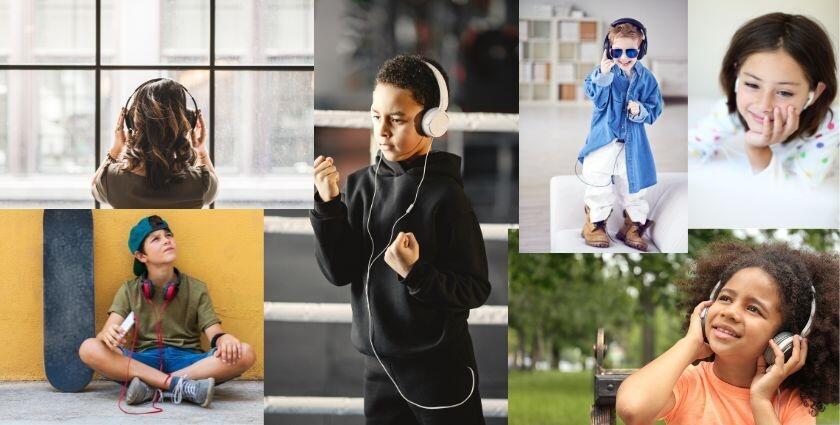
More and more kids are being diagnosed with ADHD every year.
While some speculate that the rates of occurrence are higher, others believe that we are just getting better at recognizing the symptoms.
Either way, the more we learn about ADHD, the better we can understand how our kids’ brains are wired.
Today, we’re sharing how podcasts and audiobooks can help kids with ADHD excel in school and at home.
Let’s get started.
ADHD: A Brief Explainer
There are 3 types of ADHD: hyperactive, inattentive, and combination. The names of each are pretty self explanatory, but let’s take a look at what each type entails.
- Hyperactive ADHD is the type that is most commonly thought of when you picture someone with an ADHD diagnosis. Kids with hyperactive ADHD tend to be chatty, fidgety, and impulsive.
- Inattentive ADHD isn’t usually as obvious because the symptoms don’t always manifest outwardly the way they do in kids with hyperactive ADHD. Kids with inattentive ADHD are often easily distracted and forgetful.
- Combination ADHD is the term used when a child has symptoms of both hyperactive ADHD and inattentive ADHD.
To be clear, there is absolutely nothing wrong with having a child evaluated for ADHD. In the past, there was a stigma attached to the diagnosis. Now, we know better. Knowing that your child is wired differently only serves to help you understand the way their brain works and, ultimately, give them the tools they need to be successful.
Outside the Box Thinkers and Why a “One Size Fits All” Approach Doesn’t Always Work in the Classroom or at Home
When you have a child with ADHD, you quickly realize that the “normal” way of doing things doesn’t always work.
Every kid has their own struggles and strengths — this applies to neurotypical kids as well.
When a child has difficulty sitting still, for instance, it makes sense to allow them to stand to do their work. Or to doodle during read aloud time. Or to incorporate movement activities at frequent intervals throughout the day.
If kids have trouble with transitions, it can be helpful to have a written or picture schedule posted in a main room and to give a heads up before it’s time to move on to a new activity.
When reading is a struggle, there are many interventions that can be tried at home and in the classroom. Audiobooks are an excellent tool. They are affordable, easily accessible on any smart device, and help “level the playing field” so that kids can access age-appropriate reading material even when reading is a challenge. Audiobooks also have many other benefits including practicing listening skills, building a larger vocabulary, increasing comprehension, and fostering a lifelong love of stories.
These are a few examples showing how a traditional approach doesn’t work for every child. When you have an “outside the box” thinker, you may need to change things up. Who knows? You may even find that the new way of doing things works better than you ever could have dreamed.
Differently Wired Brains and the Need For Movement
Another reason podcasts and audiobooks work really well for kids with ADHD is that movement is key for busy bodies and brains.
For kids who have trouble with sitting still or focusing for longer periods of time, reading can be a challenge. Podcasts and audiobooks allow kids to take in information through their ears while doing other things.
Kids can listen to podcasts and audiobooks in the car, at meals, during chore time, while playing, and even when going to sleep at night. This works especially well for kids who have a hard time sitting still for meals or winding down in the evenings. New and interesting audio entertainment can take mundane everyday tasks and make them fun again.
The content on Pinna is perfect for this purpose. Its massive library is well organized by age and genre, the writing is superb, and each podcast and audiobook is produced by a talented team of voice actors and sound engineers that bring the stories to life.
Audio as a Possible Solution For Overthinking and Anxiety
ADHD brains run a mile a minute. The “h” in ADHD stands for hyperactivity: not only in a physical sense, but in a mental sense too. Overthinking is a common symptom of ADHD. At times, this can be a good thing. Those with ADHD are often “idea people” — innovative and always coming up with new and better ways of doing things.
But when overthinking turns into worry and dwelling on negative thoughts, anxiety can set in. Anxiety is a common diagnosis that goes hand in hand with ADHD. Overthinking isn’t necessarily the cause of anxiety, but it can certainly contribute and make it more challenging to overcome. Anxiety is a difficult thing for adults to deal with; for kids with still developing brains, it’s so much harder.
While there are many strategies to combat overthinking and anxiety, right now we’re outlining how podcasts and audiobooks can be a helpful tool to keep in your — figurative — toolbelt. Audio entertainment provides more than just a good time. Podcasts and audiobooks offer a distraction from racing thoughts; a different, positive voice for when kids need a reprieve. Podcasts and audiobooks on Pinna are kid-safe and parent approved, available any time, and loved by listeners all over the world.
The Wrap-Up
Pinna is an excellent tool for screen-free learning and fun all year round. Keep your kids engaged and entertained with Pinna’s comprehensive and growing library.
We’re all ears!
What are your best tips for teaching kids with ADHD? We’d love to hear from you! Find us on all our social platforms – Facebook, Instagram, Twitter, and Pinterest – or email us at

 Amy Thetford
Amy Thetford